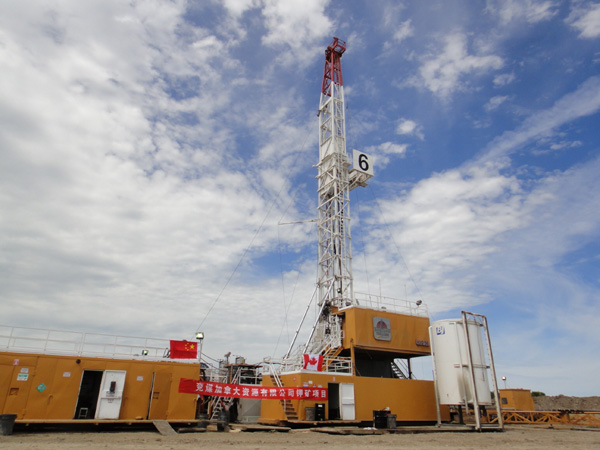Yancoal strides into the potash game
Updated: 2013-11-15 08:03
By LI NA in Toronto (China Daily USA)
|
||||||||
 |
|
The drilling site of Yancoal Canada Resources Co. Ltd in Saskatchewan. Li Na / China Daily USA |
Saskatchewan is one of the world's largest producers and exporters of potash, a plant nutrient to boost agricultural yields. Due to the world's increasing potash demand — especially from China, Brazil, and India — Saskatchewan's potash resources have become one of the world's more attractive investments, and several Chinese enterprises have obtained potash exploration and mining permits.
On Sept 29, 2011, Yancoal Canada Resources Co. Ltd acquired an aggregate of 19 potash mineral exploration permits in Saskatchewan from JSC Acron Inc for US$260 million, a deal said to position Yancoal as a central player in the emerging potash arena.
"Through the transaction, we are able to fully leverage our mining expertise and enhance commercial benefits," Ma Jianqiang, chairman of Yancoal Canada Resources, told China Daily recently.
However, further in-depth exploration work has been required since the transaction to estimate potash resources and reserves in compliance with international reporting standards.
"Although we are a newcomer to Canada's potash exploration field, we are confident in our ability to adapt to this market and keep rapidly developing our strengths," Ma said.
As a subsidiary of Yanzhou Coal Mining Company Ltd, Yancoal Canada Resources has received strong technical and financial support from its parent company, which boasts world-leading technologies, mature distribution channels, established corporate governance and compliance recording, over a decade of overseas M&A and operation experience, as well as strong financial capabilities and financing vehicles.
Potash mine development is characterized by long construction periods and intensive investment. It takes up to seven to nine years of prep work before project commission, including early prospecting, environmental impact assessment, scoping study, prefeasibility study, feasibility study and site construction.
After more than a decade of calm from new players in the province's potash mining industry, there are currently about 14 ongoing potash mine projects in Saskatchewan. The long cycle of exploration and massive investment required is expected to trigger intense competition.
"This movement has brought a rush in all industry related businesses such as potash exploration and others. However, it will be highly dependent on individual resource conditions, fund strength, and overall market development as to which project can be realized into operation and production," Ma said.
On July 30, 2013, Russia's Uralkali announcement of its withdrawal from BPC, a breach between the world's two largest potash cartels, caused considerable shock in the global potash industry. As a result, the level of the market's complexity and uncertainty has risen and intensified competition has lowered prices.
"The continuous growth of the global population will keep the global potash demand at a high level, so although the breakdown of BPC will have a short-term effect on potash prices, the industry will remain strong," Ma explained.
"On the other hand, the cartel breakup leaves more development opportunities and room for emerging potash enterprises. Therefore we are bound to look at the short-term effect of market monopoly integration-breakdown in a long-term perspective, given the long life of a mine project, and conduct target market analysis and study accordingly and thoroughly."
As a country with a large population and agricultural industry, China's potash consumption accounts for approximately 20 percent of the world's potash production. However, potash resources are scare in China, it only accounts for 2 percent of the world's total potash resources, and therefore 50 percent of its potash supply is dependent on imports.
Canada ranks number one in the world in terms of potash reserves, output and exports. The Canadian potash industry is increasingly keen on opening up and engaging other miners from around the world, including China.
According to Ma, Canada is recognized for its good investment environment with abundant mineral resources, a stable society, sound legal system, policy transparency, and its mature mining industry trade platform. The trade and investment activities between China and Canada are increasingly active following the rapid development of Sino-Canada trade relations.
However, due to the short time Chinese enterprises have been in Canada, there are recognizable differences in the countries' cultural background, legal system, language, and other possible risks and challenges.
"Therefore further learning and adaptation to the local laws and regulations as well as cultural customs are needed," Ma pointed out. "Also Chinese enterprises should look for understanding and support thorough engagement with the local communities and indigenous people to pursue win-win and cooperative mutual development."
More than 1,000 jobs will be created during the project construction period, and 350 long-term staff will be employed locally during the project operation. In addition, considerable resources will go to the local government in royalties and taxes.
"Our products will be oriented toward global market," Ma said. "At the same time we will take full advantage of our international operation experience, mining technology advantages, and fertilizer sale network in creating a synergy."

 US carrier starts Philippine storm relief
US carrier starts Philippine storm relief
 Treasures under the hammer
Treasures under the hammer
 'Reverse' vending machine sells idea of recycling
'Reverse' vending machine sells idea of recycling
 Heroic act helps thaw icy ties
Heroic act helps thaw icy ties
 Newtown families mark anniversary with a plea for parents to unite
Newtown families mark anniversary with a plea for parents to unite
 China's changing fashion since 1978
China's changing fashion since 1978
 Healthy baby born to brain-dead mom in Hungary
Healthy baby born to brain-dead mom in Hungary
 Top 10 romantic places to meet your Miss Right
Top 10 romantic places to meet your Miss Right
Most Viewed
Editor's Picks

|

|

|

|

|

|
Today's Top News
US treasury chief 'to seek commitment on market'
Newtown families mark anniversary
Green chance offered to investors
Broader access 'key' in EU talks
Over 95% of student visas to the US passed in Shanghai
Anti-graft body to issue guideline
SAT alternative makes bid for Chinese takers
GM international office moves to Singapore
US Weekly

|

|






